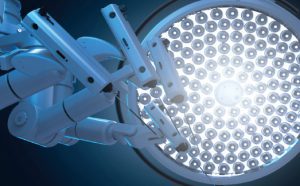Hernias are a common medical condition characterized by the protrusion of an organ or tissue through a weakened muscle or connective tissue. This condition can cause discomfort, pain, and potentially life-threatening complications. Hernias can occur in various parts of the body, with the most prevalent types being inguinal (groin), umbilical (belly button), and incisional (at the site of a previous surgical incision) hernias. While traditional surgical methods have been effective, the advent of robotic surgery has introduced significant advancements in hernia repair. In this article, we will explore hernias, the conventional surgical approaches, and the advantages of robotic surgery as a superior intervention.
 Understanding Hernias
Understanding Hernias
Hernias develop when a combination of factors, including muscle weakness and increased abdominal pressure due to activities like heavy lifting, leads to the protrusion of an organ or tissue through a weakened area. This results in a noticeable bulge or lump and may cause discomfort, pain, and other symptoms. If untreated, hernias can lead to complications such as incarceration (where the hernia becomes trapped) or strangulation (causing restricted blood flow to the herniated tissue), both of which pose serious risks to health.
Traditional Hernia Repair
Traditional hernia repair techniques have been employed for many years and are generally effective in addressing hernias. Two primary methods are commonly used:
Open Surgery:
In open surgery, a surgeon makes a sizable incision near the hernia site to access and repair the hernia. The protruding tissue is pushed back into its proper position, and the weakened muscle or tissue is reinforced using sutures or mesh. While effective, open surgery typically involves a more extended recovery period and leaves a more conspicuous scar.
Laparoscopic Surgery:
Laparoscopic surgery, on the other hand, is a minimally invasive approach. It involves creating small incisions through which a camera (laparoscope) and specialized instruments are used to repair the hernia. This technique offers a quicker recovery, less postoperative pain, and smaller scars compared to open surgery. However, laparoscopic surgery may have limitations in complex cases or with larger hernias.
The Rise of Robotic Surgery
Robotic surgery is a relatively recent innovation in the field of surgery, offering several advantages over traditional methods. In robotic surgery, a surgeon operates a robotic system equipped with specialized instruments and a high-definition camera. The surgeon controls the robot from a console, providing enhanced precision, control, and three-dimensional visualization of the surgical site. Here are the key benefits of robotic surgery for hernia repair:
Enhanced Precision and Dexterity:
Robotic surgical systems offer superior precision and dexterity, allowing surgeons to perform intricate tasks with exceptional accuracy. The robotic arms can make precise movements, reducing the risk of damage to surrounding tissues and nerves.
Three-Dimensional Visualization:
Robotic surgery provides a three-dimensional, high-definition view of the surgical area, enabling better visualization of anatomical structures. This enhanced visualization helps surgeons identify and address complex hernias more effectively.
Smaller Incisions:
Robotic surgery involves making smaller incisions compared to traditional open surgery. These smaller incisions lead to less postoperative pain, reduced scarring, and a faster recovery for patients.
Reduced Blood Loss:
Robotic surgery techniques often result in less blood loss during the procedure, reducing the need for transfusions and associated complications.
Shorter Hospital Stay:
Patients who undergo robotic hernia repair typically have shorter hospital stays compared to those undergoing open surgery. This allows patients to return to their normal activities more quickly.
Lower Risk of Infection:
Smaller incisions and reduced tissue trauma in robotic surgery decrease the risk of surgical site infections.
Improved Patient Outcomes:
Studies have demonstrated that robotic surgery can lead to better patient outcomes, including a lower rate of hernia recurrence.
Robotic Surgery for Complex Hernias
Robotic surgery is particularly advantageous in cases involving complex or recurrent hernias. Complex hernias often require intricate dissection and reconstruction of the abdominal wall, which can be challenging with traditional techniques. Robotic surgery’s precise movements and three-dimensional visualization make it an ideal choice for addressing complex hernias, leading to improved outcomes and reduced complications.
Hernias are a common medical issue that can cause discomfort and complications if left untreated. While traditional surgical methods have been effective in treating hernias, the advent of robotic surgery has revolutionized hernia repair by offering enhanced precision, three-dimensional visualization, smaller incisions, and faster recoveries.
Robotic surgery is particularly beneficial for complex hernias, where its advanced capabilities shine. Patients undergoing robotic hernia repair can expect shorter hospital stays, less postoperative pain, reduced scarring, and a lower risk of complications. As technology continues to advance, robotic surgery is likely to become the preferred method for hernia repair, providing patients with the best possible outcomes and improved quality of life. If you or a loved one is facing hernia surgery, consider benefits of robotic surgery if you would like explore if robotic surgery is right for you Dr. Enders and his team will be happy to determine the most appropriate and effective treatment plan for you or your loved one.
Dr. Ryan J. Enders is a general surgeon with BayCare Medical Group. He has a special interest in robotic hernia and bariatric surgery and is highly trained and certified in minimally invasive interventions, including advanced endoscopic, laparoscopic and da Vinci® robotic surgical techniques. Dr. Enders specializes in the diagnosis and surgical intervention of complex health conditions, like colon and breast cancers and gallbladder and hernia issues. Many of the procedures he performs can be done on an outpatient basis.
Dr. Enders earned his Doctor of Osteopathic Medicine from Nova Southeastern University College of Osteopathic Medicine in Fort Lauderdale, Florida. He completed his residency in General Surgery at the University of Pittsburgh Medical Center’s Horizon Campus in Farrell, Pennsylvania.
Dr. Enders is a member of the Society of American Gastrointestinal and Endoscopic Surgeons and is affiliated with Bartow Regional Medical Center. He believes in building honest and trusting relationships with his patients and providing a supportive and healing environment throughout the health care experience.
2000 Osprey Blvd., Suite 205
Bartow, FL 33830
Phone: (863) 733-4390 | Fax: (863) 229-7550
DrRyanEnders.org
 Central Florida Health and Wellness Magazine Health and Wellness Articles of the Villages
Central Florida Health and Wellness Magazine Health and Wellness Articles of the Villages



